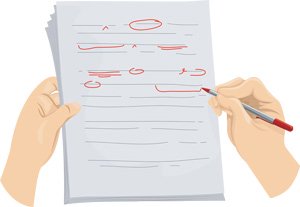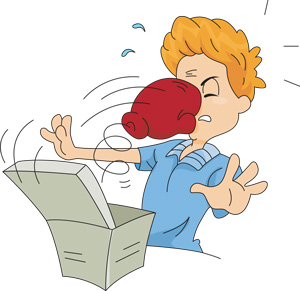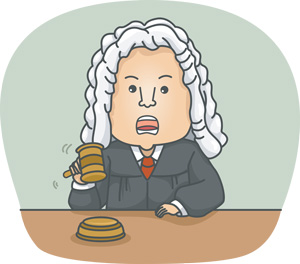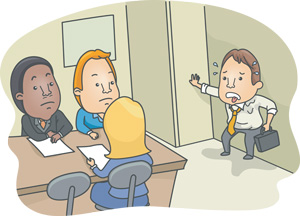Censor vs. Censure
What is the difference?
Censor and censure are two commonly confused words in English. How do you know when to use each one?
Though they look similar, they sound slightly different and have very different meanings. It's important to learn the difference between the two, otherwise you might end up harshly criticizing someone when you just meant to make sure that a movie was appropriate!
In order to understand the differences between censor and censure, let's look at some examples of each word.
Click Here for Step-by-Step Rules, Stories and Exercises to Practice All English Tenses
Censor
Censor is pronounced like SEN-ser. It sounds the same as sensor and rhymes with sir.
Censor can be a verb or a noun. As a verb, it means to examine something and remove any parts of it that are offensive, inappropriate, or secret. Things that are often censored include movies, books, letters, and official documents.
Examples:
- Mike's job is to censor swear words on TV shows.
(Mike's job is to remove any inappropriate language from TV shows, so it doesn't offend the people watching.)

- The director refused to let people censor his movies.
(The director would not let people remove the inappropriate scenes from his movies.)

- The government censors its files on aliens before it releases them to the public.
(The government hides all of its secrets about aliens in the documents it releases to the public.)

- Aldric accuses the city of trying to censor his art.
(Aldric says the city is trying to remove his art because they think it is inappropriate.)

As a noun, censor means the person who examines something to remove the offensive, inappropriate, or secret parts.
Examples:
- Mike works as a censor for TV.
(Mike's job is to remove inappropriate language and images from TV shows.)

- The censor removed all of the violent scenes from the movie.
(The person in charge of examining the film for offensive images cut all of the violence out of it.)

Censure
Censure is pronounced like SEN-shure. It rhymes with sure.
Censure can also be a verb or a noun. As a verb, it means to speak out against or criticize something, or someone, in a public way. It is usually used in formal contexts.
Examples:
- The judge censures her for behaving so carelessly.
(In front of the whole courtroom, the judge criticized her bad behavior.)

- We decide to censure our CEO for stealing money from the company.
(We publically spoke out against our boss because he was stealing.)

- The police officer was censured for sleeping on the job.
(Because he fell asleep when he was supposed to be working, the cop was publicly criticized.)

As a noun, censure means an official criticism. Receiving a censure is often part of a punishment.
Examples:
- She received a censure for browsing Facebook at work.
(Her boss wrote a letter officially criticizing her for using social media when she should be working.)

- If he faces another censure, he will lose his job.
(He will be fired if he receives another official criticism.)

- The censure from other countries did nothing to stop the dictator.
(Receiving an official criticism from other countries did not deter the dictator.)

A Story to Practice Censor vs. Censure
Kevin, the censor, is censured for not censoring the show properly. Still, receiving the censure did not make him a better censor.
Kevin thinks that, when he censors someone, he is stealing their right to free speech, so he decided to be a censor who never censors anything. In his censure, Kevin's boss asked, "What's the point of a censor who doesn't censor?"
Kevin's refusal to censor resulted in a lot of censures. Parents censured the TV station for showing inappropriate things. The TV station censured Kevin's boss for letting inappropriate things appear on their channel. Kevin faced so many censures that he lost his job as a censor.
But Kevin doesn't mind. Instead, he writes a blog to censure the TV station and posts it online, where no one can censor it. In it, he says he finally feels free, because he never has to censor someone and take away their freedom of speech again.
Quiz
Answer the following 10 questions and then check your answers. Each question is worth 10 points.
Part 1
- Which of the following is a definition of censor?
- An official criticism.
- A person who officially criticizes someone.
- To examine something and remove inappropriate parts of it.
- A person who defends free speech.
- Which of the following is a definition of censure?
- A person who publicly criticizes someone.
- An official criticism.
- To examine something and remove inappropriate parts of it.
- A person who censors things.
- Which of the following is written correctly?
- They censured my favorite part of the movie.
- She is censored for not doing her job.
- The censure removed the nudity from the music video.
- I censor movies before I let my kids watch them.
- Which of the following is written incorrectly?
- If I get another censor, I'll lose my job.
- My dream job is to work as a censor.
- The censure was very harsh and angry.
- I had to censure her.
Part 2
- Which of the following is true about censor and censure?
- They sound exactly the same.
- Censure is the past tense of censor.
- They mean the same thing.
- They are both nouns and verbs.
- Which of the following is NOT true about censor and censure?
- They mean the same thing.
- They rhyme with each other.
- They can both be adverbs.
- All of the above are untrue.
Part 3
- Angie ______ music for a living.
- censor
- censors
- censure
- censures
- Brad _______ his co-worker for playing pranks on him.
- censored
- censured
- censor
- censure
- The ______ said the joke was inappropriate for TV and cut it from the show.
- censures
- censured
- censors
- censored
- According to the _______, the politician was accepting bribes.
- censor
- censored
- censure
- censured
Answer Key
1. C | 2. B | 3. D | 4. A | 1. D | 2. D | 1. B | 2. B | 3. C | 4. C
Get Updates, Special Offers, and English Resources
Download your FREE GIFT (the first two chapters of
English Short Stories Book and Workbook)
as soon as you join!

By submitting your email, you consent to receiving updates and newsletters from us and to the sharing of your personal data with third parties for the purposes of sending you communications. We will not spam you. You can unsubscribe at any time. For more information, please see our privacy policy.





